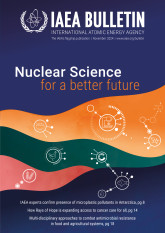
If you would like to learn more about the IAEA’s work, sign up for our weekly updates containing our most important news, multimedia and more.
Water resources in Africa are under pressure due to growing water demand, water quality degradation and climate change. On the continent, more than 41 groundwater aquifers are shared by two or more countries, making a joint approach to protection beneficial.
African scientists in the Sahel have found quality groundwater sources through South–South cooperation, thanks to a nuclear technique and a decade of IAEA support in building capacities in isotopic hydrology to determine the age, vulnerability and sustainability of water.
The IAEA is equipped with a state-of-the-art Isotope Hydrology Laboratory that maps water and provides scientific insights for the sustainable management of water resources such as rivers, lakes and underground aquifers.
IAEA-trained experts from 13 Sahel countries* are now leading studies into shared groundwater resources in 5 basins, bolstering transboundary water management.
“Today, it is thanks to the support of the IAEA in my training that our laboratory produces high quality analytical results and can conduct research projects and provide good quality analytical services even outside Togo,” said Togolese scientist Goumpoukini Boguido.
Boguido completed his doctoral degree with IAEA support; he now manages the Applied Hydrology and Environmental Geology Laboratory of the University of Lomé in Togo, and conducts analyses of water samples for the region with a laser isotope analyser provided by the IAEA. He also supervises university students to help train the next generation of African isotope hydrologists.
Through an IAEA postgraduate programme, 60 students are learning to map groundwater resources, thereby improving regional self-reliance. Abdallah Mahamat Nour, head of the HydroGeosciences and Reservoirs Laboratory at the University of N’Djamena in Chad, said that the IAEA has helped his work as a postdoctoral fellow.
“My postdoctoral project has made it possible to make significant progress in understanding the water resources of the Lake Chad basin,” said Mahamat Nour. “The support has enabled me to set up a range of tools and equipment that are now very useful for laboratory activities.” Mahamat Nour also supervises the research work of several Chadian IAEA fellows, guiding them in their research projects.
_________________________________________________________________________
* Algeria, Benin, Burkina Faso, Cameroon, Central African Republic, Chad, Ghana, Mali, Mauritania, Niger, Nigeria, Senegal and Togo.

